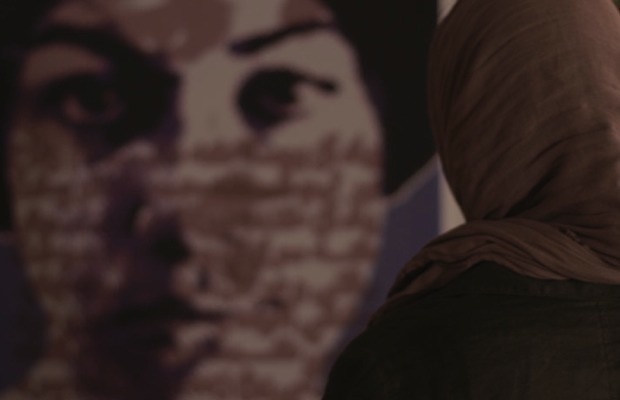Reviews
Red Rose | 2014 TIFF Review
Beware the Beauty of the Single Red Rose
Though she’s lived in France for more than three decades, Sepideh Farsi has carved out a career directing movies about the political struggles in her home country of Iran. Red Rose, her fifth narrative feature film, takes place in June 2009, during the Green Revolution that occurred after Iranian President Mahmoud Ahmadinejad was re-elected despite reports of electoral doctoring and fraud. It’s a tautly constructed thriller that works as a shining example of how an effective story can be told with a very limited production cost.
Utilizing an abundance of actual footage from the protests and riots, Farsi immerses us in the action before mirroring the style of erratic handheld devices to draw us into our main characters. Sara (Mina Kavani), a young political radical heavily integrated in the revolution, barrels her way into the home of Ali (Vassilis Koukalani) with a group of friends during a police raid. The transition between found footage and staged production is seamless, giving a heightened visceral sensibility to these opening moments where complete strangers sit in silence, waiting for the police to move on.
From here, Red Rose takes its true form as a psychological drama. Sara, having left her cell phone at Ali’s flat after the riot, returns by herself. With a cigarette in hand and forthright, uninhibited disposition, she takes charge of the situation and conversation while Ali plays gracious host. It’s a power dynamic that persists, giving us the impression that Ali is little more than a pawn in a far more elaborate game of political duplicity.
Though the action is confined almost entirely to Ali’s apartment, this character interplay and gender binary never grows dull. Both actors, embodying their respective characters with a natural sense of mystery, stay guarded while toying with the flirtation necessary to fuel the belief that he would repeatedly let her in his home and that she would keep coming. During the early stages of the film, Sara makes use of Ali’s laptop to upload videos of the protests, which injects secondary motivations without directly implying any overt subterfuge on her part.
Smartly, Farsi balances the political and personal, injecting their gentle manipulation of each other with constant reminders of the action unfolding outdoors. Sara animatedly discusses the passion she feels and the intensity of the riots, repeatedly asking Ali how he can be so indifferent and defeatist when it comes to social injustice. His passive attitude towards bigger picture political change is mirrored by his passivity in their sexual acts, which she instigates and takes charge of, even when he attempts to assert his masculinity during repeat acts.
Where Red Rose struggles is in some of the obvious metaphors and clumsy juxtapositions. Sexuality, for example, is consistently linked to violence. An impending orgasm quickly cuts to footage of the riots, reiterating a rather puerile theme of testosterone—pent up ejaculate—leading to anarchy and aggression. It’s a peculiar trajectory that contradicts the character breakdowns, which posit Sara as a vampy Joe Eszterhas creation using sex as a weapon. The implications are as misandrist as they are misogynist, empowering and chastising Sara for exploiting her own sexuality.
Clearly, the intentions of this narrative are to demonstrate the danger in complacency; yet, the duplicitous behaviour of Sara, a product of an empowered generation of women that a more progressive government would allow, doesn’t exactly suggest that this progress would result in positive social change.
Despite these minor digressions and some on-the-nose imagery, Farsi’s latest work is a rather accomplished and impressive work. There’s a palpable sense of unease that’s heightened by the gradual revelation of motivations and character traits that ultimately shape the conclusion. It’s quite an achievement to craft a feature length film in a single space without exhausting structural and narrative potential, and even more of an achievement to do so while balancing ideological motivations with the demands of a successful surface plot.
Reviewed on September 7th at the 2014 Toronto International Film Festival – Contemporary World Speakers Programme. 87 Minutes
★★★½/☆☆☆☆☆
Robert Bell is a Toronto-based film critic for IONCINEMA.com and Exclaim! Magazine, where he was also the editor for film festivals and books. Robert covers North American Film Festivals such as Sundance, Hot Docs, Tribeca and TIFF. Robert studied film theory and screenwriting at York University and has a background in independent film production. Top Films From Contemporary Film Auteurs: Campion (The Piano), Kiarostami (Certified Copy), von Trotta (Hannah Arendt), Marsh (The Theory of Everything), Haneke (The White Ribbon), von Trier (Antichrist), Seidl (Dog Days), Moodysson (Lilya 4-Ever), Ramsay (Ratcatcher). Winterbottom (The Claim), Malick (The Tree of Life), Ceylan (Once Upon a Time in Anatolia), Cronenberg (Dead Ringers), Verhoeven (Starship Troopers), Bigelow (Point Break), Jordan (The Crying Game), The Dardennes (Lorna's Silence), Zyvagintsev (The Return), Porumboiu (Police, Adjective), Ozon (Dans la Maison).






















